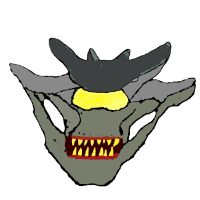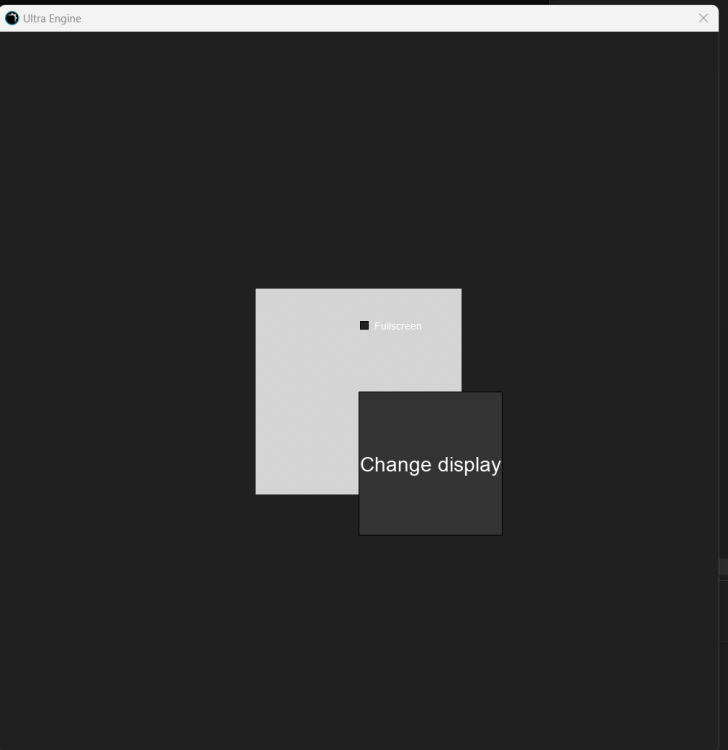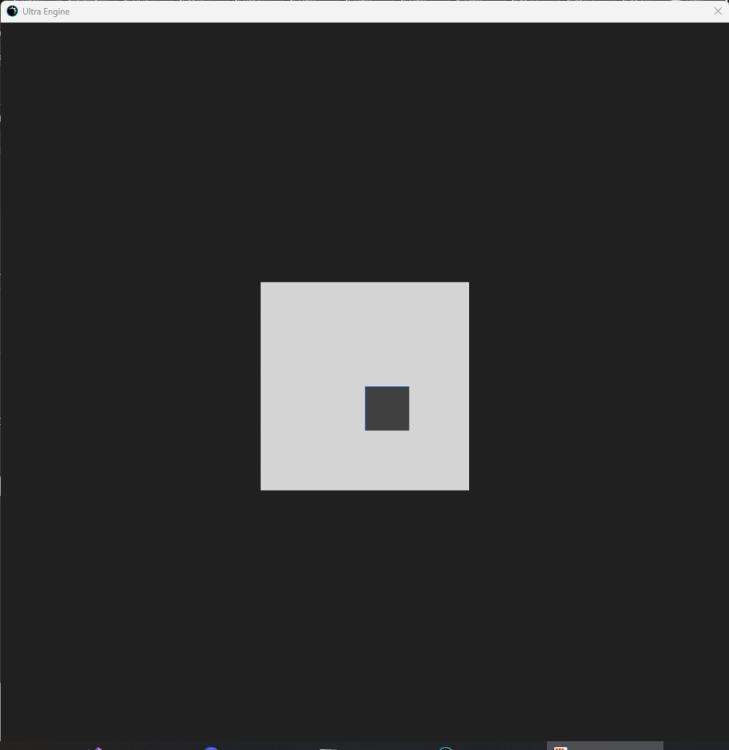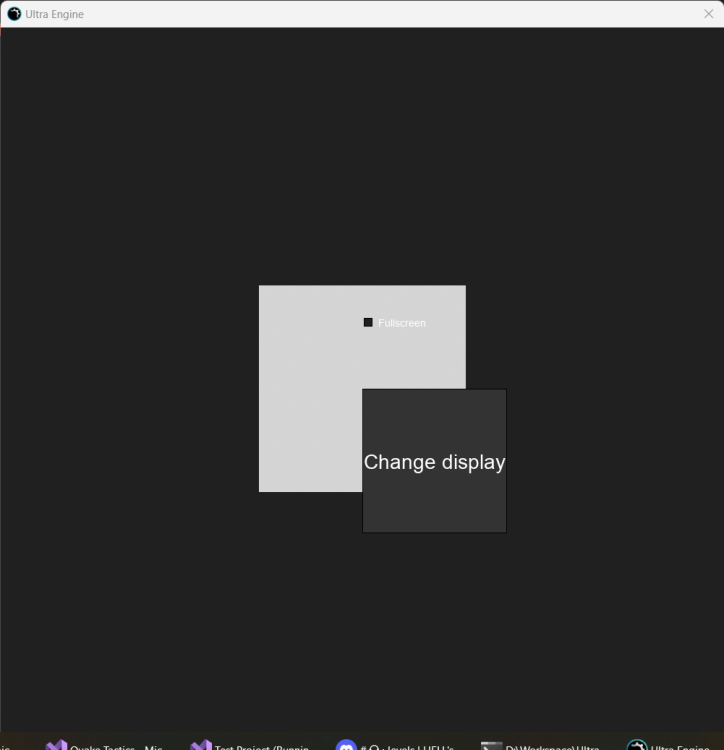Search the Community
Showing results for tags 'vulkan'.
-
Release also have lower fps but difference is not that noticeable. "Benchmark" test with stable build: Beta branch: Example code: #include "UltraEngine.h" using namespace UltraEngine; shared_ptr<Window> window; shared_ptr<Framebuffer> framebuffer; shared_ptr<World> menuWold; shared_ptr<Interface> ui; shared_ptr<Camera> uiCamera; shared_ptr<Widget> panel; shared_ptr<Icon> icon1; shared_ptr<Icon> icon2; bool isFirst = true; void initGui() { auto default_font = LoadFont("Fonts\\arial.ttf"); ui = CreateInterface(menuWold, default_font, framebuffer->GetSize()); ui->SetRenderLayers(2); ui->root->SetColor(0.0f, 0.0f, 0.0f, 0.0f); uiCamera = CreateCamera(menuWold, PROJECTION_ORTHOGRAPHIC); uiCamera->SetPosition((float)framebuffer->GetSize().x * 0.5f, (float)framebuffer->GetSize().y * 0.5f, 0); uiCamera->SetRenderLayers(2); uiCamera->SetClearMode(CLEAR_DEPTH); panel = CreatePanel(10, 50, 64, 64, ui->root, PANEL_DEFAULT); icon1 = LoadIcon("https://raw.githubusercontent.com/UltraEngine/Documentation/master/Assets/Icons/help.svg"); icon2 = LoadIcon("https://raw.githubusercontent.com/UltraEngine/Documentation/master/Assets/Icons/new.svg"); } int main(int argc, const char* argv[]) { //Get the displays auto displays = GetDisplays(); //Create a window window = CreateWindow("Ultra Engine", 0, 0, 1280, 720, displays[0], WINDOW_DEFAULT); //Create a world menuWold = CreateWorld(); menuWold->RecordStats(); //Create a framebuffer framebuffer = CreateFramebuffer(window); //Create light auto light = CreateBoxLight(menuWold); light->SetRange(-10, 10); light->SetRotation(15, 15, 0); light->SetColor(2); //Create camera auto camera = CreateCamera(menuWold); camera->SetClearColor(0.125); camera->SetPosition(0, 0, -3); camera->SetFov(70); //Main loop while (window->Closed() == false and window->KeyDown(KEY_ESCAPE) == false) { if (window->KeyHit(KEY_SPACE)) { if (!ui) initGui(); isFirst = !isFirst; if (isFirst) { panel->SetIcon(icon1); } else { panel->SetIcon(icon2); } } window->SetText("FPS: " + String(menuWold->renderstats.framerate)); menuWold->Update(); menuWold->Render(framebuffer, false); } return 0; }
-
I'm not sure if this is an intended function or a bug sop do with it as you will. See the pictures below for a clearer idea. It appears to be the grid lines that are continuously visible in the editor and also when the 'game' is run...
-
When i'm trying to create Sprite with Pixmap texture it's invisible. Label and usual Sprites can be seen #include "UltraEngine.h" using namespace UltraEngine; int main(int argc, const char* argv[]) { //Get the displays auto displays = GetDisplays(); //Create a window auto window = CreateWindow("Ultra Engine", 0, 0, 1280 * displays[0]->scale, 720 * displays[0]->scale, displays[0], WINDOW_CENTER | WINDOW_TITLEBAR); //Create a framebuffer auto framebuffer = CreateFramebuffer(window); //Create a world auto world = CreateWorld(); auto light = CreateBoxLight(world); light->SetRange(-10, 10); light->SetRotation(15, 15, 0); light->SetColor(2); //Create camera auto camera = CreateCamera(world); camera->SetClearColor(0.125); camera->SetPosition(0, 0, -3); camera->SetFov(70); auto default_font = LoadFont("Fonts\\arial.ttf"); auto ui = CreateInterface(world, default_font, framebuffer->GetSize()); ui->SetRenderLayers(2); ui->root->SetColor(0.0f, 0.0f, 0.0f, 0.0f); auto uiCamera = CreateCamera(world, PROJECTION_ORTHOGRAPHIC); uiCamera->SetPosition((float)framebuffer->GetSize().x * 0.5f, (float)framebuffer->GetSize().y * 0.5f, 0); uiCamera->SetRenderLayers(2); uiCamera->SetClearMode(CLEAR_DEPTH); auto label = CreateLabel("TEST GUI LABEL", 100, 100, 100, 50, ui->root); auto pixmap = CreatePixmap(iVec2(100, 100)); pixmap->Fill(Vec4(0.5f, 0.5f, 1, 1)); auto tex = CreateTexture(TEXTURE_2D, 100, 100, TEXTURE_RGBA, { pixmap }, 1, TEXTURE_CLAMP_UV); auto mtl = CreateMaterial(); mtl->SetTexture(tex); mtl->SetShadow(false); mtl->SetTransparent(true); mtl->SetShaderFamily(LoadShaderFamily("Shaders/WidgetBlock.fam")); //Create pixmap sprite auto sprite = CreateSprite(world, 0, 0); sprite->SetPosition(0, 0); // sprite->SetViewMode(SPRITEVIEW_BILLBOARD); sprite->SetMaterial(mtl); sprite->SetText("Test"); sprite->SetRenderLayers(2); //Create usual sprite auto sprite2 = CreateSprite(world, 2, 2); sprite2->SetPosition(2, 0, 0); sprite2->SetViewMode(SPRITEVIEW_BILLBOARD); //Main loop while (window->Closed() == false and window->KeyDown(KEY_ESCAPE) == false) { world->Update(); world->Render(framebuffer); } return 0; }
-
If i drag or create window at 2nd screen ui is looks broken, button can be pressed tho. Also if i try to create full window at non main display it's still appears on main one. Editor UI works fine on all displays. Main screen: Second screen: Third screen: #include "UltraEngine.h" using namespace UltraEngine; shared_ptr<Window> window; shared_ptr<Framebuffer> framebuffer; shared_ptr<World> menuWold; shared_ptr<Interface> ui; shared_ptr<Camera> uiCamera; shared_ptr<Widget> btn; shared_ptr<Widget> btn2; bool fullscreen = false; int displayId = 0; void initGui() { auto default_font = LoadFont("Fonts\\arial.ttf"); ui = CreateInterface(menuWold, default_font, framebuffer->GetSize()); ui->SetRenderLayers(2); ui->root->SetColor(0.0f, 0.0f, 0.0f, 0.0f); uiCamera = CreateCamera(menuWold, PROJECTION_ORTHOGRAPHIC); uiCamera->SetPosition((float)framebuffer->GetSize().x * 0.5f, (float)framebuffer->GetSize().y * 0.5f, 0); uiCamera->SetRenderLayers(2); uiCamera->SetClearMode(CLEAR_DEPTH); btn = CreateButton("Change display", (float)framebuffer->GetSize().x / 2, framebuffer->GetSize().y / 2, 200, 200, ui->root); btn->SetFontScale(2.0f); btn2 = CreateButton("Fullscreen", (float)framebuffer->GetSize().x / 2, framebuffer->GetSize().y / 2 - 100, 120, 30, ui->root, BUTTON_CHECKBOX); if (fullscreen) btn2->SetState(WIDGETSTATE_SELECTED); } void changeDisplay() { auto displays = GetDisplays(); displayId = ++displayId; if (displayId == displays.size()) { displayId = 0; } if (!fullscreen) { window = CreateWindow("Ultra Engine", 0, 0, 1000, 1000, GetDisplays()[displayId], WINDOW_DEFAULT); } else { window = CreateWindow("Ultra Engine", 0, 0, displays[displayId]->GetSize().width, displays[displayId]->GetSize().height, displays[displayId], WINDOW_DEFAULT | WINDOW_FULLSCREEN); } framebuffer = CreateFramebuffer(window); initGui(); } int main(int argc, const char* argv[]) { //Get the displays auto displays = GetDisplays(); //Create a window window = CreateWindow("Ultra Engine", 0, 0, 1000, 1000, displays[0], WINDOW_DEFAULT); //Create a world menuWold = CreateWorld(); //Create a framebuffer framebuffer = CreateFramebuffer(window); //Create light auto light = CreateBoxLight(menuWold); light->SetRange(-10, 10); light->SetRotation(15, 15, 0); light->SetColor(2); //Create camera auto camera = CreateCamera(menuWold); camera->SetClearColor(0.125); camera->SetPosition(0, 0, -3); camera->SetFov(70); //Create scenery auto box = CreateBox(menuWold); initGui(); //Main loop while (window->Closed() == false and window->KeyDown(KEY_ESCAPE) == false) { while (PeekEvent()) { const Event ev = WaitEvent(); if (ev.source == btn && ev.id == EVENT_WIDGETACTION) { changeDisplay(); } if (ev.source == btn2 && ev.id == EVENT_WIDGETACTION) { fullscreen = !fullscreen; } ui->ProcessEvent(ev); } menuWold->Update(); menuWold->Render(framebuffer); } return 0; }
-
In 2D seems to be still working: But in 3D: #include "UltraEngine.h" using namespace UltraEngine; shared_ptr<Window> window; shared_ptr<Framebuffer> framebuffer; shared_ptr<World> world; shared_ptr<Interface> ui; shared_ptr<Camera> uiCamera; shared_ptr<Widget> panel1; shared_ptr<Widget> panel2; shared_ptr<Widget> panel3; void initGui() { auto default_font = LoadFont("Fonts\\arial.ttf"); ui = CreateInterface(world, default_font, framebuffer->GetSize()); ui->SetRenderLayers(2); ui->root->SetColor(0.0f, 0.0f, 0.0f, 0.0f); uiCamera = CreateCamera(world, PROJECTION_ORTHOGRAPHIC); uiCamera->SetPosition((float)framebuffer->GetSize().x * 0.5f, (float)framebuffer->GetSize().y * 0.5f, 0); uiCamera->SetRenderLayers(2); uiCamera->SetClearMode(CLEAR_DEPTH); panel1 = CreatePanel(20, 20, 100, 100, ui->root); panel1->SetColor(1, 0, 0, 1, WIDGETCOLOR_BACKGROUND); panel2 = CreatePanel(50, 50, 100, 100, panel1); panel2->SetColor(0, 1, 0, 1, WIDGETCOLOR_BACKGROUND); panel3 = CreatePanel(25, 25, 100, 100, panel2); panel3->SetColor(0, 0, 1, 1, WIDGETCOLOR_BACKGROUND); } int main(int argc, const char* argv[]) { //Get the displays auto displays = GetDisplays(); //Create a window window = CreateWindow("Ultra Engine", 0, 0, 300, 300, displays[0], WINDOW_CENTER | WINDOW_TITLEBAR); //Create a world world = CreateWorld(); world->SetAmbientLight(0); //Create a framebuffer framebuffer = CreateFramebuffer(window); //Create a camera auto camera = CreateCamera(world); camera->SetClearColor(0, 0, 0); initGui(); //Main loop while (window->Closed() == false and window->KeyDown(KEY_ESCAPE) == false) { world->Update(); world->Render(framebuffer); } return 0; }
-
After resizing icon of yellow armor becomes a blue one. Red also becomes blue. Green stays green. Used to be fine several months ago. #include "UltraEngine.h" #include "ComponentSystem.h" using namespace UltraEngine; shared_ptr<Window> window; shared_ptr<Framebuffer> framebuffer; shared_ptr<World> world; shared_ptr<Interface> ui; shared_ptr<Camera> uiCamera; shared_ptr<Widget> panel; shared_ptr<Widget> panel2; bool isFirst = true; void initGui() { auto default_font = LoadFont("Fonts\\arial.ttf"); ui = CreateInterface(world, default_font, framebuffer->GetSize()); ui->SetRenderLayers(2); ui->root->SetColor(0.0f, 0.0f, 0.0f, 0.0f); uiCamera = CreateCamera(world, PROJECTION_ORTHOGRAPHIC); uiCamera->SetPosition((float)framebuffer->GetSize().x * 0.5f, (float)framebuffer->GetSize().y * 0.5f, 0); uiCamera->SetRenderLayers(2); uiCamera->SetClearMode(CLEAR_DEPTH); panel = CreatePanel(10, 10, 50, 50, ui->root, PANEL_DEFAULT); panel2 = CreatePanel(10, 70, 100, 100, ui->root, PANEL_DEFAULT); auto pixmap = LoadPixmap("/gfx/items.wad/armor2");//yellow armor panel->SetPixmap(pixmap); auto pixmap2 = pixmap->Resize(pixmap->size.x * 1.5f, pixmap->size.y * 1.5f);//blue now O_o panel2->SetPixmap(pixmap2); } int main(int argc, const char* argv[]) { //Get the displays auto displays = GetDisplays(); //Create a window window = CreateWindow("Ultra Engine", 0, 0, 300, 300, displays[0], WINDOW_CENTER | WINDOW_TITLEBAR); //Create a world world = CreateWorld(); world->SetAmbientLight(0); //Create a framebuffer framebuffer = CreateFramebuffer(window); //Load FreeImage plugin auto plg = LoadPlugin("Plugins/FITextureLoader"); auto quakeLoaderPlugin = LoadPlugin("Plugins/QuakeLoader"); //Load model WString path = AppDir(); auto pak = LoadPackage(path + "/PAK0.PAK"); ChangeDir(path); //Create a camera auto camera = CreateCamera(world); camera->SetClearColor(0, 0, 0); camera->Move(0, 0, -0.3); camera->SetRange(0.01, 100); camera->SetFov(70); initGui(); //Main loop while (window->Closed() == false and window->KeyDown(KEY_ESCAPE) == false) { world->Update(); world->Render(framebuffer); } return 0; }
-
idk if there is another proper way to change a resolution of window. This way works in 2D UI. #include "UltraEngine.h" using namespace UltraEngine; bool EventCallback(const Event& ev, shared_ptr<Object> extra) { auto window = extra->As<Window>(); window->SetSize(1024, 768); return true; } int main(int argc, const char* argv[]) { auto displays = GetDisplays(); auto window = CreateWindow("Ultra Engine", 0, 0, 1280, 720, displays[0], WINDOW_CENTER | WINDOW_TITLEBAR); auto world = CreateWorld(); auto framebuffer = CreateFramebuffer(window); auto camera = CreateCamera(world); camera->SetClearColor(0.125); camera->SetFov(70); camera->SetPosition(0, 0, -3); auto default_font = LoadFont("Fonts\\arial.ttf"); auto ui = CreateInterface(world, default_font, framebuffer->GetSize()); ui->SetRenderLayers(2); ui->root->SetColor(0.0f, 0.0f, 0.0f, 0.0f); auto ui_camera = CreateCamera(world, PROJECTION_ORTHOGRAPHIC); ui_camera->SetPosition((float)framebuffer->GetSize().x * 0.5f, (float)framebuffer->GetSize().y * 0.5f, 0); ui_camera->SetRenderLayers(2); ui_camera->SetClearMode(CLEAR_DEPTH); auto btn = CreateButton("change res", 0, 0, 100, 30, ui->root); ListenEvent(EVENT_WIDGETACTION, btn, EventCallback, window); while (window->Closed() == false and window->KeyDown(KEY_ESCAPE) == false) { while (PeekEvent()) { auto ev = WaitEvent(); ui->ProcessEvent(ev); } world->Update(); world->Render(framebuffer); } return 0; }
-
-
Before finalizing Ultra App Kit I want to make sure our 3D engine works correctly with the GUI system. This is going to be the basis of all our 3D tools in the future, so I want to get it right before releasing the GUI toolkit. This can prevent breaking changes from being made in the future after the software is released. Below you can see our new 3D engine being rendered in a viewport created on a GUI application. The GUI is being rendered using Windows GDI+, the same system that draws the real OS interface, while the 3D rendering is performed with Vulkan 1.1. The GUI is using an efficient event-driven program structure with retained mode drawing, while Vulkan rendering is performed asynchronously in real time, on another thread. (The rendering thread can also be set to render only when the viewport needs to be refreshed.) The viewport resizes nicely with the window: During this process I learned there are two types of child window behavior. If a window is parented to another window it will appear on top of the parent, and it won’t have a separate icon appear in the Windows task bar. Additionally, if the WS_CHILD window style is used, then the child window coordinates will be relative to the parent, and moving the parent will instantly move the child window with it. We need both types of behavior. A splash screen is an example of the first, and a 3D viewport is an example of the second. Therefore, I have added a WINDOW_CHILD window creation flag you can use to control this behavior. This design has been my plan going back several years, and at long last we have the result. This will be a strong foundation for creating game development tools like the new engine's editor, as well as other ideas I have. This is what "not cutting corners" looks like.

















